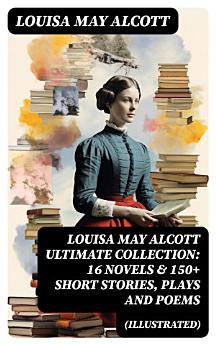LOUISA MAY ALCOTT Ultimate Collection: 16 Novels & 150+ Short Stories, Plays and Poems (Illustrated)
Dec 2023 · DigiCat
Ebook
2150
Pages
family_home
Eligible
info
reportRatings and reviews aren’t verified Learn More
About this ebook
In the comprehensive compilation titled *LOUISA MAY ALCOTT Ultimate Collection*, readers are treated to an extensive array of 16 novels alongside over 150 short stories, plays, and poems. This meticulously curated anthology displays Alcott's profound literary versatility, ranging from her most celebrated work, *Little Women*, to lesser-known gems. The collection is illustrated, enhancing the reader's engagement with Alcott's vivid storytelling and poignant themes that often reflect the struggles and triumphs of women in the 19th century. The interplay of realism and sentimentality characterizes Alcott's style, making her works resonate with a rich historical context of American literature during the post-Civil War era, as she navigates societal norms and personal aspirations. Louisa May Alcott (1832-1888) emerged from a socially conscious family rooted in transcendentalist ideals. Her father, Bronson Alcott, was a noted philosopher and educator, profoundly influencing her outlook on life and literature. This backdrop of progressive thought and feminist ideals underpins her storytelling, where strong female characters confront societal limitations, making her work not only reflective of her time but also a precursor to modern feminist literature. Readers seeking an enriching journey through the intricacies of human experience will find *LOUISA MAY ALCOTT Ultimate Collection* an invaluable addition to their literary library. Its breadth of content serves both as an introduction to Alcott's illustrious career and a deep dive into her nuanced portrayals of women's lives. This collection is a treasure trove for both long-time fans and new readers, inviting all to explore the timeless relevance of Alcott's insightful narratives.
About the author
Louisa May Alcott (1832–1888) stands out as a seminal figure in American literature, celebrated for her poignant storytelling and indelible characters. Born in Germantown, Pennsylvania, she was the daughter of Amos Bronson Alcott, a transcendentalist philosopher, and educator, and Abby May, a social worker. Alcott's works are deeply rooted in the transcendentalist movement, reflecting themes of individualism, reform, and the inherent goodness of nature and humanity. She is best remembered for her semi-autobiographical novel, 'Little Women' (1868), a groundbreaking work portraying the lives and struggles of four sisters growing up during the Civil War era. This novel, along with its sequels 'Little Men' (1871) and 'Jo's Boys' (1886), cemented her reputation as a preeminent writer of children's literature and a proponent of women's rights. Her oeuvre is extensive, as showcased in collections such as the 'LOUISA MAY ALCOTT Ultimate Collection: 16 Novels & 150+ Short Stories, Plays and Poems (Illustrated)', featuring a comprehensive body of her work, including gothic thrillers, didactic tales, and literary sketches. Alcott's literary style combines realism with romanticism, capturing the complexities of human emotions and social issues of her time. She also worked as a nurse during the Civil War, an experience that influenced her writing. Alcott's contributions to literature and her advocacy for gender equality resonate to this day, inspiring generations of readers and writers alike.
Rate this ebook
Tell us what you think.
Reading information
Smartphones and tablets
Install the Google Play Books app for Android and iPad/iPhone. It syncs automatically with your account and allows you to read online or offline wherever you are.
Laptops and computers
You can listen to audiobooks purchased on Google Play using your computer's web browser.
eReaders and other devices
To read on e-ink devices like Kobo eReaders, you'll need to download a file and transfer it to your device. Follow the detailed Help Center instructions to transfer the files to supported eReaders.








